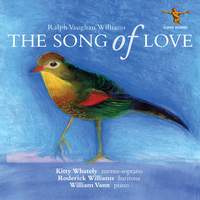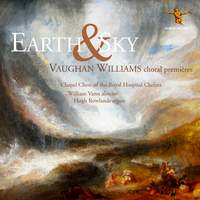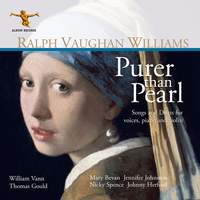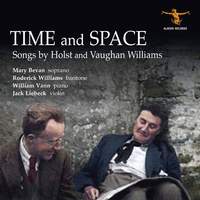Interview,
Vaughan Williams's The Song of Love
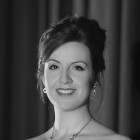 Albion Records continue to unearth and bring to light forgotten masterpieces from the British Isles - The Song of Love includes fifteen world premiere recordings of vocal music by Ralph Vaughan Williams, performed by baritone Roderick Williams, mezzo-soprano Kitty Whately and pianist William Vann.
Albion Records continue to unearth and bring to light forgotten masterpieces from the British Isles - The Song of Love includes fifteen world premiere recordings of vocal music by Ralph Vaughan Williams, performed by baritone Roderick Williams, mezzo-soprano Kitty Whately and pianist William Vann.
I spoke to Kitty and William, as well as John Francis at Albion Records, whose brainchild this recording was, about the music featured...
David: Although the “cow looking over a gate” stereotype has now been debunked, Vaughan Williams is still seen as quintessentially an English composer with a profound interest in indigenous English traditions. Why do you think he was drawn to so many French and German settings, like the ones featured here?
William: The frame of musical reference for Vaughan Williams was wide, taking in Wagner and the German romantics alongside Ravel and the early 20th century French school, so it’s no surprise that he also invested energy into finding out more about the folk traditions of those countries in particular.
John: The French and German songs on this recording are folk songs, and Vaughan Williams’s interest in folk song was clearly both English and International. In 1902 and 1903 he gave a series of six lectures on folk song at Pokesdown (Bournemouth) and Gloucester. He said then that every nation and century had its representative songs and that a nation’s songs reflected its temperament. He went on to deal in detail with the history of the folk songs of Germany and Hungary. French songs made an appearance in the fifth lecture, dealing with religious folk songs (or carols). He believed that folk song influenced all that we now recognise as a nation’s music and famously observed that ‘The art of music above all the other arts is the expression of the soul of a nation.’
William: Some or all of the French and German settings on our recording were made for Walter Ford, a Professor of Singing at the Royal Academy of Music, whose own lecture series focussed on European traditions. So there was clearly not just friendship, but a deep and common interest between them.
David: The Seumas O’Sullivan settings can be sung unaccompanied – though here they have a piano accompaniment. Why did you choose this version over the perhaps more unusual alternative?
William: It is a pity that these songs have been neglected until now. The accompaniment in these setting is one intended for performance, and not just for rehearsal – so its absence is a permitted alternative rather than the main intention. Vaughan Williams often made alternative arrangements of a piece, with a view to making the music widely available, but this indication that the piano accompaniment is optional is unusual.
The piano voice adds a rich layer of commentary to the vocal line, giving nuance, heightening emotional tension and, in the case of The Piper, an additional musical idea. So we decided to record the pair of songs ‘as written’ on this first occasion, but it would be nice to record them unaccompanied on another disc.
David: For a composer so close to the nation’s heart, it seems incredible that there should still be half an album’s worth of unrecorded music – the French and German songs, the Shakespeare and O’Sullivan settings and more. How did you come across these lost pieces?
John: Very little is really ‘lost’. Michael Kennedy compiled his Catalogue of the composer’s works fairly soon after his death, and very few errors or omissions have come to light since then. So we have a list of pieces not yet recorded that is now diminishing pretty rapidly. Some of these first recordings are of published but rarely performed works; others never made it to publication and have been recovered from manuscripts – most of which are, happily, in the British Library. Last year our recording ALBCD035, Earth and Sky, consisted entirely of choral premières, a few of which were wartime works written for a past time – but nonetheless worth hearing and remembering, partly for what we can learn about that time.
We have evidence of a very small number of genuinely lost or destroyed works… but we are still hoping.
William: Just occasionally we have been lucky enough to find a manuscript that Kennedy overlooked. Summum Bonum, a song that Vaughan Williams wrote for Parry in about 1891, is a good example. We knew of the song from the composer’s own musical autobiography, but it was not in the Catalogue. Despite that, it was in the British Library in a group of sketches; it was a great find, and a privilege to include Nicky Spence singing it in our recording ALBCD029, Purer than Pearl.
My hope in Albion issuing these recordings is that singers will be encouraged to look beyond the small body of Vaughan Williams’s vocal repertoire that is performed regularly and realise that he was a composer of extraordinary breadth. I’ve been surprised recently to chat to plenty of singers who know Silent Noon well (of course, who doesn’t!), but don’t know that it comes from a set of six songs called The House of Life. It’s so easy to stick to a small corpus of repertoire and never venture outside the classics, but there are such rich rewards when you make that voyage of discovery.
David: Many of these song-settings are earlier works, from a time when Vaughan Williams was open to pragmatic commissions. Is there any sense that they’re more workaday, even mundane settings (and might this explain why some of them have fallen out of the repertoire)?
John: I hope I’m not over-defensive, but I don’t think Vaughan Williams was ever mundane; he was a composer who very seldom repeated himself, which can make his style quite difficult to pin down. These early folk song settings give every evidence that he considered the words and the melody and applied his genius creatively. Each of the original song settings, such as the ‘Gunby Hall’ To Daffodils, is a little gem in its own right – that example perhaps benefitting from having been written for friendship.
William: Agreed, and there’s something untouchable about Vaughan Williams’s ability to find something profound and touching in the most simple moment, when you least expect it. That’s the mark of a great composer.
David: This recording is divided up between mezzo-soprano Kitty Whately and baritone Roderick Williams. How were the decisions made as to which pieces would be performed by which singer?
William: Kitty and I were hugely excited (and initially surprised!) to have the chance of making the first recording of The House of Life by a female singer. Obviously that immediately represented quite a decent chunk of the disc, so after that it was down to whatever we felt might suit each singer best. As the audience, you can decide whether or not you think we got it right: ultimately this is often a matter of taste, and deeply subjective! It was also important for us to aim for an approximately 50/50 split between the two singers, something that gives this album an attractive balance and brings out the variety and brilliance of Vaughan William’s song-writing.
As you know, we made a companion album to this over a four-day recording session at Potton Hall, with songs by both Holst and Vaughan Williams and another 14 world premières. Roderick Williams stayed with us but the other ‘half’ of ALBCD038, Time and Space, was provided by soprano Mary Bevan, accompanied sometimes by me and at others by Jack Liebeck on the violin. We’ve tried to apply the same sort of ‘balance’ to each album that we might in a live recital.
David: You mention in the notes that even in Vaughan Williams’ more socially conservative time, it caused no comment for love-songs addressed to a female lover to be sung by female singers. How much do you think the identity of the singer actually matters when performing poetry settings by (or from the perspective of) someone of a different gender?
Kitty: It has long interested me that it has always been so perfectly acceptable for a woman to sing settings of texts that are intended for a male character, and yet the same would not be said for a male singer singing to a specifically male character. But it is a new world that we are performing in, from that in which RVW was writing. It makes for very interesting and new interpretations to have gender-fluid performances of songs, when it is in order to perform music in any key which is comfortable for the singer. Whether you take my performance of The House of Life as a woman playing a ‘trouser role’, and suspend your disbelief in order to believe that I am a man; or you hear my performance as a gay woman, speaking to my female lover- the emotions are the same. I have loved hearing Alice Coote’s interpretation of Schumann’s Dichterliebe, traditionally performed by men, and I have even heard of male singers delving into Frauenliebe und -Leben. I think these hugely popular and regularly performed works deserve new and unique interpretations and interesting twists on the ‘norm’ and, at this point in society’s progress, there is no reason at all for it to be in any way an issue for a character to be singing to a same-sex lover.
William: I’ll defer to Kitty’s extensive reply: simply to say that in the history of music, and art in general, gender issues (and fluidity of gender) have often been explored in a manner that society itself might not accept quite so easily. But what is readily accepted in Mozart’s operas and Strauss’s songs can come up against a barrier when an audience hears a song in the vernacular. Perhaps it’s time to be a bit more broad-minded!
'The Song of Love' was released on 13th September on Albion Records, and features duets and solo songs by Vaughan Williams.
Available Formats: CD, MP3, FLAC, Hi-Res FLAC
William Vann and his choir present an album almost entirely composed of world-premiere recordings - choral works and arrangements ranging from rousing patriotic songs to folk melodies and sacred anthems.
Available Formats: CD, MP3, FLAC, Hi-Res FLAC
Purer than Pearl
William Vann (piano), Thomas Gould (violin), Mary Bevan (soprano), Jennifer Johnston (mezzo), Nicky Spence (tenor), Johnny Herford (baritone)
A collection of songs and duets with piano, and in many cases violin, accompaniment and featuring the premiere recordings of six songs from early in Vaughan Williams' career.
Available Formats: CD, MP3, FLAC, Hi-Res FLAC
Time and Space
Roderick Williams (baritone), Mary Bevan (soprano), William Vann (piano), Jack Liebeck (violin)
Shared between Holst and Vaughan Williams, this album (released on 11th October 2019) showcases the close friendship between the two composers, and the cross-pollination of ideas that they shared.
Available Formats: CD, MP3, FLAC, Hi-Res FLAC


